Online Reputation Management: The Complete Guide
Online reputation management (ORM) means making sure that when people search for your name or business online, they see the right information first.
Most of the time, that means what shows up on Google.
But it's bigger than just blue links on a search results page. Your online reputation is also influenced by:
- Review sites (Google, Yelp, industry-specific platforms)
- News articles and blog posts
- Business and professional profiles (LinkedIn, directories, marketplaces)
- High-authority platforms that rank easily and shape first impressions
What ORM Is (and Isn't)
Online reputation management (ORM) is not just "posting more content."
Content is helpful, but it's not the only thing. The main goal of ORM is to change how people see and think about you when they look for you online.
Two different pages can say almost the same thing about your business:
- One ranks on page one and gets all the clicks
- The other never leaves page three and might as well not exist
The difference usually isn't the words—it's:
- Placement (does it show up where people look?)
- Source authority (is it on a site people and search engines trust?)
- Context (does it match what searchers are trying to figure out?)
ORM focuses on those levers.
In practice, effective ORM means:
- Boosting accurate, positive, high-quality results so they're easy to find
- Reducing the visibility of harmful, outdated, or misleading pages by giving Google better alternatives to rank
At the same time, ORM has clear limits. It:
- Does not guarantee removal of negative content
- Does not erase factual reporting or public records
- Does not work overnight—search engines need time to discover, evaluate, and re-rank new pages
You're not controlling the internet—you're guiding what people see first when it matters most.
What This Guide Explains
This guide explains:
- Why ORM matters in today's search-driven decision process
- How online reputation is shaped and ranked
- The main ORM strategies used to build, protect, and repair reputation
Why Online Reputation Management Matters
People form opinions about you before they talk to you.
That matters because search results are often the first interaction someone has with a brand, professional, or service.
One negative headline or review, if it ranks high, changes perception instantly. People don't scroll through results. They don't investigate intent. They make a decision.
Online reputation isn't just about "reviews."
It includes:
- Search results
- News headlines
- Profiles and directories
- Social proof
- Ratings and feedback
All of these affect trust, credibility, and choice.
When negative or outdated content ranks above positive and accurate results, it creates a skewed first impression. That impression can lower conversions, decrease calls, and weaken trust—often long before someone engages with you.
Effective ORM changes what people see first. It ensures that the most visible content supports, rather than undermines, your credibility.
How Online Reputation Is Shaped (What Actually Influences Rankings)
Your online reputation is shaped by what Google shows first.
Most people do not scroll. They click one of the first few results and move on. That means only a small number of pages actually influence how you're perceived.
Ahrefs study on how much traffic pages get from Google shows that more than 90% of all web pages receive no traffic from Google at all, which means visibility is concentrated in a very small set of results.
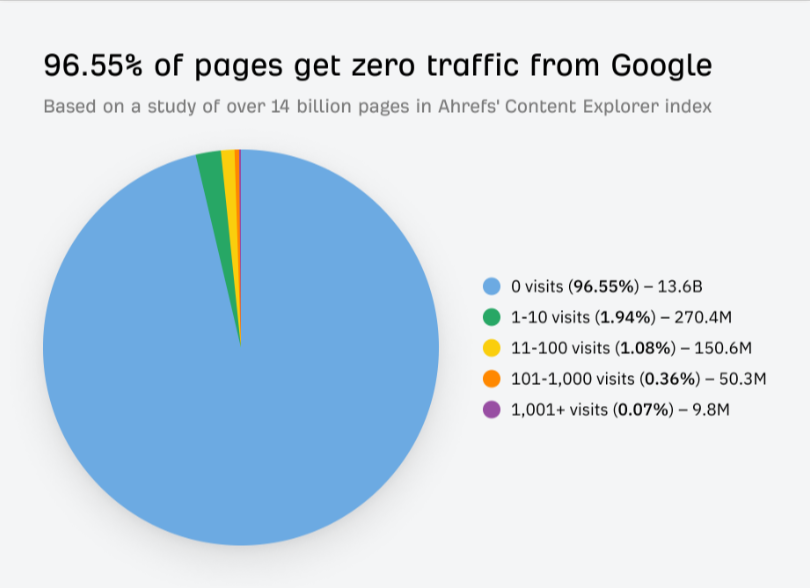
So why do certain pages rank while most never appear?
Here are the reasons, explained clearly.
Website Authority
Established sites rank more easily
Name Matching
Exact name matches rank higher
User Clicks
Popular results stay visible
Available Content
Google ranks what exists
The website matters
Google does not treat all websites equally.
Pages published on established websites rank more easily than pages on small or new sites. This includes major news outlets, well-known review platforms, large business directories, social networks, and government or university websites.
Google explains this in its Search Quality Rater Guidelines, where it states that sites with a strong reputation, long history, and many independent references are considered more trustworthy.
Source: Google Search Central
This is why an article on a national news site often ranks above a personal blog, even when the blog is newer.
Name matching matters
Google pays close attention to what someone types into the search bar.
When a page includes a person's full name or business name in the page title, headline, and main text, Google sees it as a strong match to the search.
Google refers to this as search relevance, which it explains in its overview of how Google Search works. Pages that closely match the search terms are more likely to rank, even if the information is outdated.
This is why old profiles, articles, or directory listings often remain visible for name-based searches.
Clicks matter
Google also looks at how people interact with search results.
When users consistently click a result, Google takes that as a sign that the page is meeting their needs. Results that keep getting chosen are less likely to be replaced.
Google confirms that it evaluates user interaction signals as part of its ranking systems, as outlined in its documentation on search ranking systems.
Pages with negative or dramatic headlines often attract more clicks, which can help them stay visible longer.
Available content matters
Google can only rank pages that exist.
If there are only a few pages about a person or business online, those pages will fill the search results by default. Google does not create balance on its own.
This is explained in Google's documentation on crawling, indexing, and ranking. If better alternatives do not exist, Google has nothing else to show.
This is why people with little online presence are more vulnerable to a single negative result ranking highly.
How ORM fits into this
Online reputation management works by changing what Google has available to rank.
That means publishing accurate content on trusted websites, creating pages that clearly match name-based searches, and introducing stronger alternatives to outdated or misleading results.
When better options exist, Google can rank them. That is how online reputation changes in practice.
The Main Types of ORM Strategies
Online reputation management uses different strategies depending on the situation.
There is no single fix. What works for one person or business may not work for another. The right approach depends on what already exists online and what needs to change.
Most ORM efforts fall into three categories.
Proactive
Build presence before problems appear
- Create business profiles
- Publish helpful content
- Claim listings
- Monitor mentions
Reactive
Address existing reputation issues
- Publish context updates
- Strengthen positive pages
- Request corrections
- Respond to reviews
Defensive
Long-term protection against future risks
- Maintain trusted sources
- Keep profiles current
- Publish regularly
- Monitor for mentions
Proactive ORM
Proactive ORM is about building a strong online presence before problems appear.
This strategy focuses on creating accurate, high-quality content on trusted platforms so search results reflect who you are today. It is most effective for business owners, executives, professionals, and public-facing brands.
Proactive ORM typically includes:
- Creating and maintaining complete business and professional profiles
- Publishing helpful, factual content on established websites
- Claiming and optimizing listings on review and directory platforms
- Monitoring search results and brand mentions
This approach works because Google can only rank content that exists. When strong content is already in place, it is harder for a negative or misleading page to take over.
Google explains the importance of strong, trustworthy content in its guidance on creating helpful, reliable content.
Reactive ORM
Reactive ORM is used after a reputation issue appears.
This includes negative articles, unfair reviews, misleading profiles, or outdated information that ranks prominently. The goal is not to erase history, but to reduce the visibility of content that no longer represents the full picture.
Reactive ORM may involve:
- Publishing accurate updates that provide context
- Strengthening positive pages so they outrank harmful ones
- Requesting corrections when information is factually wrong
- Responding to reviews in a professional, documented way
This strategy relies on replacing weak or outdated search results with stronger alternatives. Google does not remove pages simply because they are old. New content must compete and earn its position.
Google outlines this process in its explanation of how search ranking works.
Defensive ORM
Defensive ORM focuses on long-term protection.
It is used to reduce future risk and prevent single pages from dominating search results. This approach is common for executives, founders, and individuals in high-visibility roles.
Defensive ORM usually includes:
- Maintaining multiple trusted sources that rank for name searches
- Keeping profiles current across platforms
- Publishing content regularly to avoid gaps
- Monitoring for new mentions and acting early
This strategy works because search engines favor consistency and freshness over time. When accurate information is regularly updated, it becomes harder for outdated or negative content to gain traction.
Google reinforces this in its documentation on search quality and trust signals.
Using the wrong ORM strategy wastes time. Publishing new content will not help if a single negative article dominates results and needs to be addressed directly. On the other hand, focusing only on damage control without building a stronger foundation leaves you exposed in the future.
Effective ORM starts with understanding which strategy applies, then executing it consistently.
What ORM Can and Cannot Do
Online reputation management has clear limits.
Knowing those limits helps people avoid bad advice, false promises, and wasted effort.
What ORM Can Do
- Improve what appears first in search results
- Request corrections for false information
- Reduce the visibility of harmful results
- Manage reviews within platform rules
What ORM Cannot Do
- Remove truthful reporting
- Promise guaranteed removals
- Change search results overnight
- Override real behavior
What ORM can do
Improve what appears first in search results
ORM can help accurate and helpful pages rank higher by adding stronger content that search engines prefer. Google explains that rankings change when new, relevant, high-quality content becomes available, not just because time passes, in its explanation of how search results are ranked.
Request corrections for false information
When content is factually wrong, ORM can involve asking publishers or platforms to correct it. Google allows users to flag and request changes for content they believe is inaccurate, as outlined in its guide on removing information you believe is false.
Reduce the visibility of harmful results
ORM can push outdated or misleading pages lower in search results by creating stronger alternatives. This works through competition. Search engines rank what they believe is most useful, not what appeared first.
Manage reviews within platform rules
ORM includes responding to reviews, encouraging honest feedback, and reporting reviews that break the rules. The Federal Trade Commission explains what businesses can and cannot do in its guidance on consumer reviews and endorsements.
What ORM cannot do
It cannot remove truthful reporting
ORM cannot delete legitimate news articles, public records, or factual reporting simply because they are negative. Google states this clearly in its overview of content removal policies.
It cannot promise guaranteed removals
No company controls what third-party websites publish. Only the site owner, a court, or a platform can decide to remove content.
It cannot change search results overnight
Search engines need time to find, review, and rank new pages. Google explains this process in its overview of how crawling and indexing work.
It cannot override real behavior
If a business continues to generate complaints or unresolved disputes, that activity will keep appearing online. The FTC makes clear that online reputation is tied to actual consumer experiences in its overview of truthful advertising and business practices.
ORM works by improving what exists online. It does not erase facts or bypass platform rules. Any service that claims otherwise is not being honest.
How Long ORM Takes (A Real Example)
ORM progress is easier to understand with a real example.
NewReputation worked with a tri-state tree service that had been in business for years and was well known locally. The company did good work, but their online presence did not reflect that.
Their situation was common:
- An average review rating of 3.1
- Old negative reviews ranking prominently
- Weak local SEO
- Very little useful content online
- About 200 website visits per month
Nothing was "broken" overnight. The reputation problem built up slowly, and that meant it needed to be fixed step by step.
Step 1: Review Collection
Proactively requested reviews from real customers
✓ Changed tone of online presenceStep 2: Technical Fixes
Fixed site speed, local signals, and service pages
✓ Search engines understood the businessStep 3: Content Creation
Created content around real customer searches
✓ Visibility + credibility improvedStep 4: Results
Traffic grew from ~625 to 1,000+ monthly visits
✓ Rating improved from 3.8 to 4.2Step one: give customers a place to speak
We started by proactively requesting reviews from real customers.
Most customers want to be heard. When you give them a clear, easy way to leave feedback, they are far less likely to vent publicly without context. Instead, they often give the business a chance to respond and fix issues directly.
This alone began to change the tone of their online presence.
Step 2: Fix the Foundation
Next, we addressed the technical issues holding them back in search.
On audit, we found:
- Slow page speeds (especially on mobile)
- Weak location signals (unclear service areas, missing local cues)
- Missing or thin service pages (Google couldn't easily see what they actually did)
We fixed the basics:
- Improved site speed and mobile performance
- Clarified service areas and added strong local signals
- Created and cleaned up core service pages so each main service had its own clear, useful page
Once this foundation was in place, search engines could finally:
- Understand what the business offered
- Recognize where they operated
- Match them to the right local searches
Step 3: Answer Real Customer Searches
With the technical fundamentals in better shape, we moved to content.
Instead of generic blog posts, we focused on what real customers were actually searching for. That meant creating content around:
- Service questions (e.g., "Do I need a permit for tree removal?")
- Cost expectations (e.g., "How much does tree trimming cost near me?")
- Seasonal concerns (e.g., storms, dead limbs, winter prep)
- Local tree care issues (e.g., regional pests, common local tree diseases)
Each article was built around real search intent, not just loosely targeted keywords.
At the same time, the company:
- Became more active on social media
- Shared before-and-after photos, project highlights, and customer reviews
- Reinforced the same messages and branding across platforms
This combination—useful content + visible social proof—boosted both visibility and credibility.
What Changed After 30 Days
You don't usually see full ORM results in 30 days, but you can see early signals.
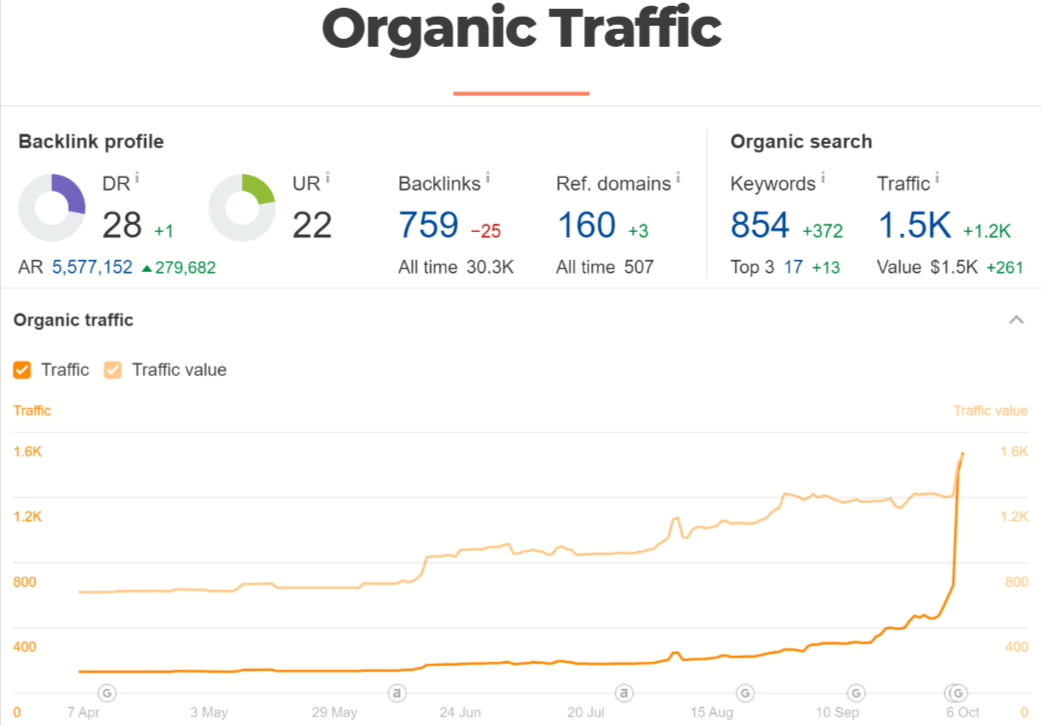
Within the first month, they saw:
- Monthly website traffic: from ~625 visits to 1,000+
- Search impressions: more visibility for relevant terms (an additional 6,000 impressions, then an additional 30,000 impressions as content indexed and started ranking)
These early gains showed that:
- The technical fixes were working
- The new content was getting picked up
- Google was starting to treat the site as more relevant for local searches
What Changed Over Six Months
The real story showed up over a longer window.
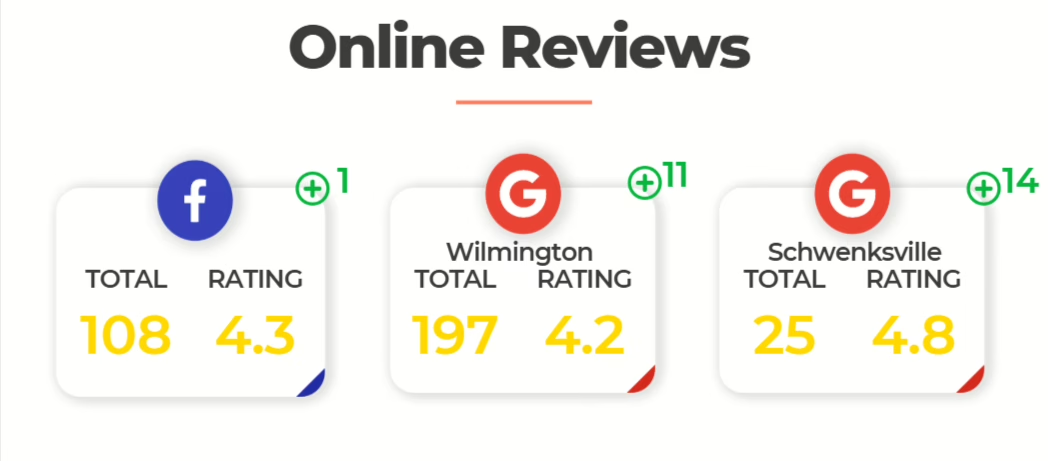
After six months of consistent ORM and SEO work, the business saw:
- Review rating: increased from 3.8 to 4.2 (with a healthier volume of recent reviews)
- Search results: positive, relevant content began to replace outdated and negative results on page one
- Local visibility: stronger presence in local search and map results for target services and areas
But the most important change wasn't just in metrics—it was in perception.
New customers now saw an online profile that:
- Matched the company's real-world service quality
- Showed recent, authentic reviews
- Explained services, pricing expectations, and local expertise clearly
Their online reputation finally caught up with the reputation they'd already earned offline. That's what realistic ORM looks like in practice—gradual, measurable improvement driven by better experiences, better visibility, and better information, not overnight tricks.
Common ORM Mistakes (And Why They Set Businesses Back)
Most reputation damage does not come from a single incident.
It comes from repeated mistakes that could have been prevented.
Waiting too long to engage with reviews
→ Older negative feedback controls perceptionResponding emotionally or not at all
→ Signals indifference to customersChasing content removal
→ Wastes effort on unlikely takedownsPublishing irrelevant content
→ Content never ranks or helpsInconsistent business data
→ Reduces trust and local visibilityStopping after initial success
→ Old negatives resurface over timeWaiting too long to engage with reviews
Ignoring review activity until ratings drop gives older negative feedback more control over perception.
Research from the Medill Spiegel Research Center at Northwestern University shows that online reviews influence consumer decisions and that early review activity increases visibility and conversion. When a business lacks recent feedback, older negative reviews have disproportionate influence.
Responding emotionally or not at all
Some businesses respond defensively. Others never respond.
Failing to engage publicly signals indifference to customers. Studies compiled by Business News Daily show that responding to both positive and negative reviews increases trust and can benefit reputation and purchase decisions.
Chasing content removal instead of improving visibility
A frequent mistake is prioritizing content removal rather than strengthening the pages that rank around it.
Third-party platforms control reviews and public feedback. Even reviews businesses dislike usually stay online because platforms view them as consumer voice. Yelp's guidelines explain how review filters and moderation work, showing why takedown efforts rarely succeed unless the content violates specific rules.
Publishing content that does not match actual searches
Creating articles or pages without addressing what real customers search for keeps content from ranking.
Research shows consumers use search engines to make fast decisions based on relevance, not promotional language. According to Pew Research Center, people rely heavily on search when choosing products or services, which means ORM content must match clear informational needs like services, pricing, and local concerns.
Overlooking data consistency across platforms
When business names, addresses, telephone numbers, or service details are inconsistent across Google, Yelp, Facebook, and directories, trust drops.
The Better Business Bureau emphasizes that consistent, accurate listings reduce consumer confusion and build credibility, while mismatches often lead to negative perception and complaints.
Stopping once some results improve
Some businesses slow or stop ORM activities after initial success.
Search platforms constantly reassess what to show based on freshness and relevance. If review requests stop, new content isn't created, and old negatives can resurface.
How to Tell If You Need ORM (Actionable Steps)
Run a Clean Search
Use incognito mode to see unbiased results
Review Page One Only
Focus on what people actually see
Check Review Activity
Look at recency, not just ratings
Verify Listing Accuracy
Ensure consistent NAP across platforms
Identify Content Gaps
Look for missing service or pricing info
Decide If ORM Is Required
Assess if reputation needs intervention
Run a Clean Search
Open an incognito or private browser window.
Search:
- Your full name
- Your business name
- Your business name + city or service
Focus only on the top three results. Research from Backlinko shows that most clicks go to the first few listings, while lower results are rarely noticed.
If the top results are outdated, negative, or incomplete, that poses a reputation risk.
Review Only Page One
Do not scroll past the first page.
Eye-tracking research from the Nielsen Norman Group indicates users scan quickly and base decisions on what they see first.
Ask one question:
Would a new customer trust what they see here?
If the answer is no, ORM is necessary.
Check Review Activity, Not Just Ratings
Look at:
- Average rating
- How recent the last review is
- Whether reviews are being answered
Research from ReviewTrackers shows that customers trust businesses more when reviews get responses, even if the feedback is negative. If reviews are old or unanswered, perception becomes negative.
Verify Listing Accuracy
Check your business name, address, phone number, and services on:
- Yelp
- Major directories
Local search research from Moz shows that inconsistent listings reduce trust and local visibility.
If information does not match everywhere, it needs to be corrected.
Identify Content Gaps
Search your name or business and look for:
- Clear service explanations
- Pricing or process information
- Recent updates or articles
Content research from the Content Marketing Institute shows that missing or sparse content causes customers to lose confidence and keep searching. If you do not control the answers people seek, search results will fill in the gaps for you.
Decide If ORM Is Required
ORM is necessary if any of the following are true:
- One or two negative results dominate page one
- Reviews are outdated or unanswered
- Business information is inconsistent
- Accurate content is missing or hidden
At that point, reputation is being shaped without your input.
What Good ORM Looks Like When Customers Talk for You
Online reputation is not built by statements.
It is built by what people say when the business is not in the room.
You can see this clearly on Reddit.
Costco: Customers explain the policy for the company
In this Reddit thread, a customer describes returning an item to Costco and how easy the process was:
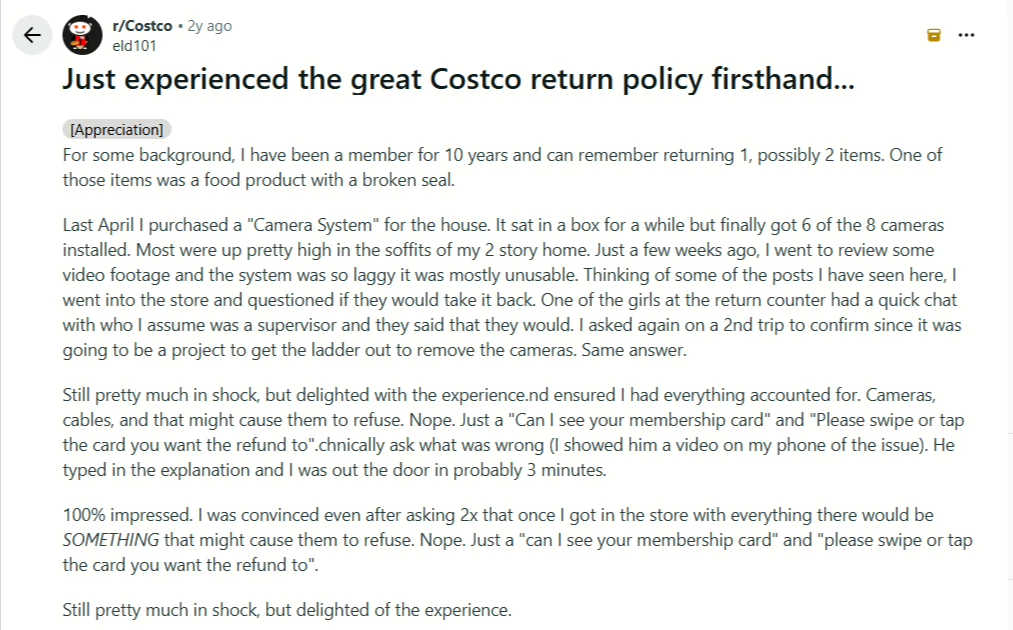
What happens next is important.
Other customers reply and explain Costco's return policy in plain language. They explain what Costco allows, what it does not allow, and why the return worked. Costco does not reply. Employees do not jump in. The community handles the explanation.
This helps Costco's reputation because:
- People trust other customers more than brand messages
- The policy sounds consistent when many people describe it the same way
- Anyone reading the thread understands what to expect before shopping
This works because Costco's return process is simple and consistent. Customers feel confident explaining it publicly because they have seen it work. That confidence turns into reputation.
NVIDIA: Clear information keeps problems from getting worse
In this Reddit thread, a user asks about returning a faulty NVIDIA graphics card:

People respond by sharing timelines, steps, and outcomes. The discussion stays calm and factual because users know what usually happens.
In contrast, this thread shows what happens when communication breaks down:
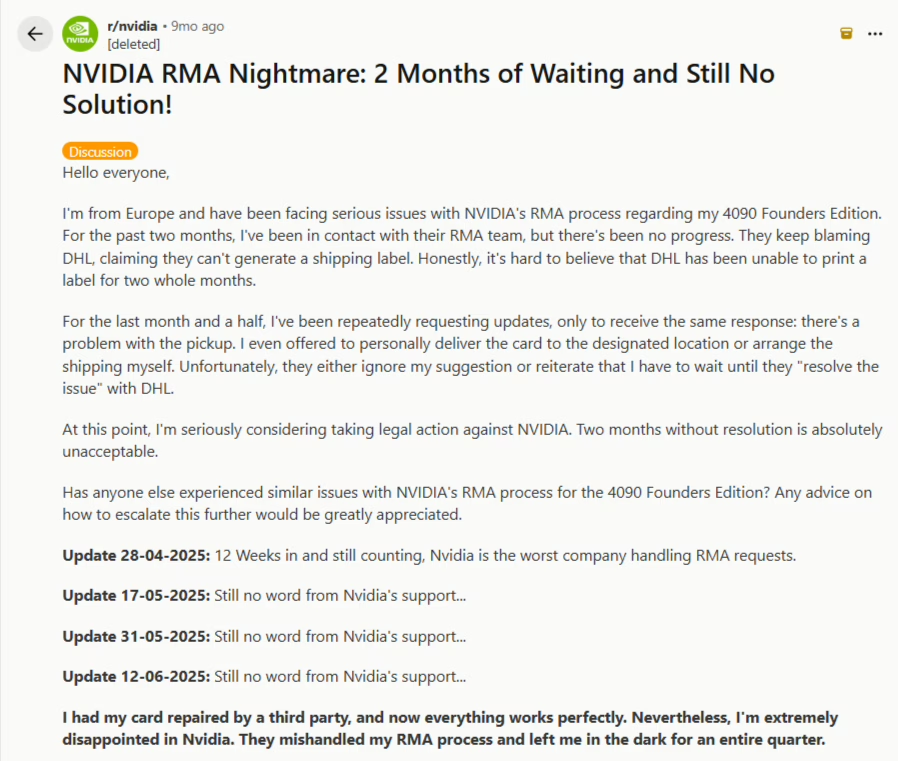
Here, the user does not know what is happening or when the issue will be resolved. The comments become emotional. The thread grows longer. Frustration spreads.
These two threads show the same issue with different outcomes. The difference is not the product. The difference is clarity.
When customers know the steps and timing, they explain the process to each other. When they do not, speculation replaces facts.
That speculation becomes part of the brand's online reputation.
Process becomes reputation when it is repeatable
This Reddit post compares two different return experiences across brands:
The post is detailed. It lists steps, wait times, and communication gaps. Other users comment and compare their own experiences.
This matters because people are not judging tone or marketing.
They are judging how predictable the process is.
When many people describe the same steps and outcomes, readers assume the process is reliable. When stories vary wildly, readers assume risk.
Search engines pick up these discussions. So do customers doing research.
Why this matters for reputation
These Reddit threads show how reputation forms in real time.
Reputation improves when:
- ✓ Customers can explain what will happen next
- ✓ Policies are simple enough to repeat accurately
- ✓ Problems are handled the same way each time
- ✓ Confusion is reduced before it turns into anger
Reputation suffers when:
- ✗ Customers do not know what to expect
- ✗ Timelines are unclear
- ✗ Communication stops
- ✗ People fill gaps with assumptions
Online reputation management is not about controlling the conversation. It is about creating experiences that produce clear, repeatable stories when customers talk to each other.
How to Get Started With ORM
You do not need a budget or special software to start managing your online reputation.
You need a few free tools and a clear order of steps.
Basic Website
Google Sites, WordPress.com, or Wix
Mobile-Friendly Test
Google's free tool to check mobile usability
Google Search Console
See how your site appears in search
Google Alerts
Get notified when you're mentioned online
Business Profiles
Google, Yelp, Facebook listings
Review Response
Tools to help respond professionally
Make sure you have a basic website
If you do not have a website, start here.
Your website gives search engines and customers a place to find accurate information.
Free options:
- Google Sites
- WordPress.com
- Wix (free plan)
Your site should clearly show:
- Business name
- What you do
- Where you operate
- How to contact you
Even a simple one-page site is enough to start.
Check if your site works on mobile
Most people search on their phones.
If your site is hard to read or slow on mobile, people leave.
Use Google's free Mobile-Friendly Test:
https://search.google.com/test/mobile-friendly
If Google says your site is not mobile friendly, fix this before doing anything else.
Set up Google Search Console
Google Search Console shows how your site appears in Google search.
It is free.
Set it up here:
https://search.google.com/search-console/about
With Search Console, you can:
- See what searches bring people to your site
- Check for errors Google finds
- Request Google to recheck updated pages
This helps you understand what Google sees, not what you think is happening.
Create Google Alerts for your name or business
Google Alerts notify you when new pages mention your business online.
Set it up here:
https://www.google.com/alerts
Create alerts for:
- Your business name
- Your name (if you are a public-facing owner)
- Common misspellings
This helps you catch problems early, before they grow.
Claim and clean up your main profiles
Search engines trust consistent information.
Make sure your business details match everywhere.
Start with:
- Google Business Profile
- Yelp
Check:
- Business name spelling
- Address
- Phone number
- Services
Fix anything that does not match exactly.
Start responding to reviews the right way
Do not ignore reviews. Do not argue.
If you are not sure what to say, use tools that help you respond calmly and clearly.
NewReputation offers a Review Response Generator that helps write professional, respectful replies for both positive and negative reviews. This keeps tone consistent and avoids emotional responses.
Understand sentiment, not just star ratings
Star ratings do not tell the full story.
Sentiment shows whether people feel positive, neutral, or negative overall.
NewReputation's Sentiment Analysis Tool helps you:
- See patterns in feedback
- Identify common complaints
- Spot improvement over time
This helps you fix real issues instead of guessing.
Create simple, helpful content
Write content that answers common questions.
Start with:
- What services do you offer?
- How does the process work?
- What does it cost?
- What should customers expect?
Post answers on your website.
You do not need long articles. Clear answers matter more.
Check results once a month
ORM is not daily work.
Once a month:
- Search your business name
- Check new reviews
- Review Google Search Console
- Read Google Alerts
This keeps you ahead of problems instead of reacting late.
You do not need to control the internet.
You need to:
- Make accurate information easy to find
- Respond calmly when people speak
- Watch for changes over time
Everything above can be done for free. That is how ORM starts the right way.
Conclusion
Online reputation management is about ensuring people find clear, accurate information when they search for your business.
In this guide, we covered what ORM is, why it matters, how reputation spreads online, and what strong ORM looks like in real-world examples. We also went through simple, free steps anyone can take to get started, from setting up basic tools to responding to reviews the right way.
You do not need to control every conversation to protect your reputation. You need to be present, consistent, and clear where people look first.
If you want help responding to reviews or understanding customer sentiment, NewReputation's tools can make that process easier and more consistent.
What is the first step you plan to take to improve your online reputation?

